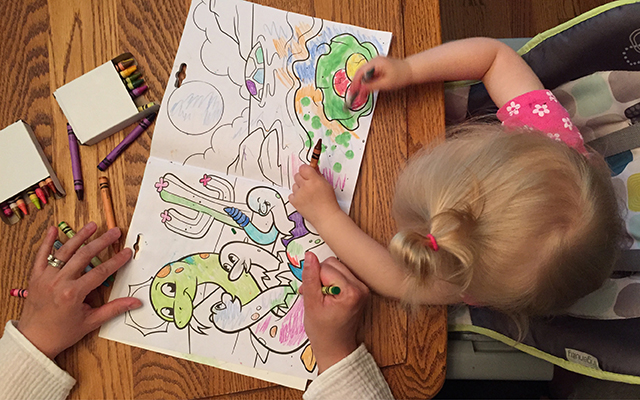This blog post was meant for last week. No, strike that: It was supposed to get written and published before Memorial Day. But it wasn’t, well, quite “right.”
If you’re a lifelong self-diagnosed perfectionist like myself, you know this internal struggle. You withhold producing or releasing your work or art to the public because you want to take another run at it. It needs another revision, for the umpteenth time, or what you think is “perfect” is skewed by your fear of others’ perception.
The struggle is real, friends, and overanalyzing your creations can be a huge barrier to actually accomplishing anything at all. My father-in-law has a few sayings he’s repeated that have spurred the perfectionists in the family into action:
“Sometimes better done than done better.”
and, adapted from Voltaire’s writings,
“Don’t let perfect be the enemy of good.”
As a newish mom, my perfectionist tendencies have only been exacerbated by the desire to do what’s best for my daughter. I struggled for months searching for the perfect rustic-looking changing table for the nursery (ah, the foibles of Pinterest, even with its many joys), and later settled on a dresser from our in-laws (the simpler, usable — and best of all, free! — choice). I rejected a daycare center when they couldn’t identify the source of their food supplier. I cringe when my father even jokes about taking the baby to McDonald’s. Finding the perfect car seat, stroller, and weighing if all her clothes needed to be organic cotton and gender neutral — or is 100 percent cotton and a surplus of pink A-OK?
It’s exhausting, really, to place such importance on every single decision: Not only am I wasting mental energy and time, I feel more inhibited thinking others see me as some neurotic control freak. I can only hope that those who know and love me — and most importantly, respect me — realize my role as a mother is to do what I feel is best and healthiest for my child. You don’t have to agree with my choices or parenting style, but with real love comes respect for allowing others to live in the world differently than yourself.
My bigger consideration, really, isn’t that the adults in my life don’t understand me (while it can be hurtful, my rule-breaking choices have put me in black-sheep territory before and I’ve learned to do my best to accept it). Rather, how will my daughter see me as she grows? Will she put a similar pressure on herself to act and project an air of rightness? Will she find herself paralyzed with fear over getting something “wrong”?
Project Me
I know I need to continue to make letting go of perfectionism central to Project Me, but what does that entail?
Embrace the “The Gifts of Imperfection,” as Brené Brown, PhD, LMSW, coined as the title of her terrific book. Brown, a research professor at the University of Houston Graduate College of Social Work, who has spent more than a dozen years studying vulnerability, worthiness, and shame, shares beautiful insights into why appreciating not only our successes but also our failures leads to true growth and connection. Her books, including my first introduction to her work in Daring Greatly, have led to light-bulb moments for me. (Get an overview of her wisdom in “The Unexpected Gifts of Imperfection.”)
Make the pursuit of excellence your new standard. This tip from writer Victor Lipman in Forbes is a much better driving force than perfection. I want my work to be the best I think it can be, but know that there’s always room for improvement. And I don’t always need to improve upon every single thing. Two other familiar sayings, to “pick your battles” and “just do your best,” resonate with this message as well. Focus on what’s most important to your values, and let the rest go. When it doesn’t always go as planned, take a deep breath and move on, remembering that there are lessons to be learned in mistakes. If I’m not happy with the outcome, I think to myself, Is it really the worst thing to happen? The answer is usually unfortunate, perhaps, but no — life is still wonderful and the world still turns.
Erase the definition of “perfect” altogether. Think about it: “Perfect” in who’s eyes? My cousin noted this recently when we spoke, how she thought I was the “perfect” mom before I started sharing my struggles on this blog. It surprised and flattered me, because when I saw faults, she saw greatness. We all have our challenges, and even if one person seems to have it all together, they may feel differently. The benefit of accepting that we are all flawed creatures is much more liberating than seeking out some fictionalized ideal self. I’m a lot happier to shift my focus from perfection to wabi-sabi, the Japanese philosophy of “imperfect beauty,” knowing that my quirks or seeming “faults” are what make me unique.
Full disclosure: I read, re-read, and reworked this piece six times. Perfectionist traits are hard to break, after all, and allowing for imperfect beauty in myself will take practice.
Just like coloring outside the lines with my toddler, I’ll get there by continually giving myself permission.

This Post Has 0 Comments